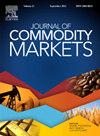Do oil market shocks affect financial distress? Evidence from firm-level global data
IF 4.5
4区 经济学
Q1 BUSINESS, FINANCE
引用次数: 0
Abstract
This study investigates the impact of three oil price shocks on financial distress of global firms using a dataset of 8130 firms across 48 countries from 2002 to 2022. It also analyses the role of energy diversification in the relationship between oil shocks and firm distress. The findings reveal that aggregate demand and specific demand shocks increase firm distress risk, while supply shocks reduce it. Furthermore, the results suggest that energy diversification mitigates the impact of specific demand shocks on firm distress. The study also implements several robustness checks, and the results remain consistent. Potential policy implications are also discussed.
石油市场冲击会影响财务困境吗?来自公司层面全球数据的证据
本研究使用 2002 年至 2022 年 48 个国家 8130 家公司的数据集,研究了三次石油价格冲击对全球公司财务困境的影响。研究还分析了能源多样化在石油冲击与企业困境之间关系中的作用。研究结果表明,总需求和特定需求冲击会增加企业困境风险,而供应冲击则会降低风险。此外,研究结果表明,能源多样化减轻了特定需求冲击对企业困境的影响。研究还进行了若干稳健性检验,结果保持一致。研究还讨论了潜在的政策影响。
本文章由计算机程序翻译,如有差异,请以英文原文为准。
求助全文
约1分钟内获得全文
求助全文
来源期刊

Journal of Commodity Markets
Multiple-
CiteScore
5.70
自引率
2.40%
发文量
53
期刊介绍:
The purpose of the journal is also to stimulate international dialog among academics, industry participants, traders, investors, and policymakers with mutual interests in commodity markets. The mandate for the journal is to present ongoing work within commodity economics and finance. Topics can be related to financialization of commodity markets; pricing, hedging, and risk analysis of commodity derivatives; risk premia in commodity markets; real option analysis for commodity project investment and production; portfolio allocation including commodities; forecasting in commodity markets; corporate finance for commodity-exposed corporations; econometric/statistical analysis of commodity markets; organization of commodity markets; regulation of commodity markets; local and global commodity trading; and commodity supply chains. Commodity markets in this context are energy markets (including renewables), metal markets, mineral markets, agricultural markets, livestock and fish markets, markets for weather derivatives, emission markets, shipping markets, water, and related markets. This interdisciplinary and trans-disciplinary journal will cover all commodity markets and is thus relevant for a broad audience. Commodity markets are not only of academic interest but also highly relevant for many practitioners, including asset managers, industrial managers, investment bankers, risk managers, and also policymakers in governments, central banks, and supranational institutions.
 求助内容:
求助内容: 应助结果提醒方式:
应助结果提醒方式:


